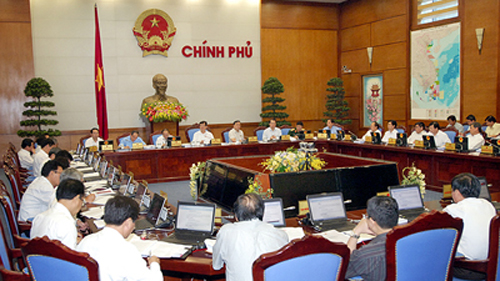Solutions needed to help businesses access bank loans
PM Dung and cabinet members said the socio-economic status in the reviewed period saw positive changes, showing the efficiency of measures to curb inflation and stabilize the macro-economy.
Since July 2011, the consumer price index (CPI) growth has gradually dropped to reach its lowest figure over the same period of previous years. Specifically, January’s CPI rose 1 percent, February 1.37 percent, March 0.16 percent and April 0.05 percent.
April’s CPI increased 2.6 percent compared to last December, the lowest level over the past three years.
On monetary policy and credits,
the State Bank of Vietnam (SBV) lowered the ceiling interest rate from 14
percent to 12 percent/year while the credit interest rate was reduced by 1-1.5
percent from the beginning of this year. 
Many credit measures were taken to support agriculture, rural development, small and medium sized enterprises, production of goods for export, the processing industry and labour-intensive sectors.
Over the past four months, total export turnover was estimated at US$33.4 billion, up 22.1 percent over the same period last year, while total import turnover reached US$33.6 billion, up 4 percent. Import surplus hit roughly US$176 million, equivalent to 0.53 percent of total export earning, much lower than the previous years.
Despite still facing many difficulties, industrial production in March and April improved remarkably thanks to drastic tax relief measures to support businesses in boosting production and seeking consumption markets. Agro-forestry-fishery production continued steady development.
Total retail consumer service revenues soared 21.6 percent and the number of foreign tourists to Vietnam reached 2.5 million, up 22.9 percent over one year earlier.
Cabinet members pointed out weakness in the national economy: Interest rates have been lowered but remain high, outstanding credit fell sharply and businesses’ capability to attract credit capital was limited. In addition, industrial growth in April was much lower than in the first four months and the number of businesses which suspended operations or dissolved was higher than the same period last year. Meanwhile, a section of residents still encountered a lot of difficulties in life.
Cabinet members underlined the need for solutions to speed up the development of agricultural and industrial production, practise thrift, reduce production costs, improve product competitiveness and business production, promote trade, expand export markets, control exports and trade deficit, and create the best possible conditions for businesses to access bank loans.
Sharing the view on removing obstacles for businesses, Minister of Industry and Trade Vu Huy Hoang and Minister of Labour, Invalids and Social Affairs Pham Thi Hai Chuyen proposed that this year’s CPI should be maintained at 9 percent, and controlling inflation should go along with preventing economic slowdown to ensure that all people can benefit from economic growth.
SBV Governor Nguyen Van Binh said it is imperative to speed up the disbursement and distribution of capital resources for public investment projects, create more jobs and increase incomes for workers, especially those who lost their jobs at dissolved businesses.
Minister of Agriculture and Rural Development Cao Duc Phat asked localities to coordinate closely with his ministry and relevant agencies in controlling epidemics, forest fires and the use of banned substances in food.
Cabinet members highlighted the need to persist with strong measures to control inflation and stabilize the macro-economy by managing the monetary policy and interest rates and ensuring the money supply.
They also stressed the necessity of ensuring social welfare by devising solutions to reduce poverty rapidly and sustainably in poor districts and communes, and providing vocational training and jobs for rural workers.
Deputy Ministers Nguyen Xuan Phuc, Vu Van Ninh and Hoang Trung Hai asked the SBV to take into account issues related to bad debts to ensure liquidity and more flexible management of credit structures.
At the meeting, cabinet members also discussed solutions to remove barriers hindering the increase of investment efficiency with a focus on barriers from economic mechanisms, economic system, production and State management over investment.
In conclusion, PM Nguyen Tan Dung proposed continuing to lower interest rates based on the gradually falling inflation rate, facilitating business access to bank loans and keeping credit loans at reasonable levels. He also requested the SBV to restructure the banking system, ensure liquidity and take measures to deal with bad debts.
PM Dung asked the Ministry of Finance to ensure budget balance, keep this year’s State budget overspending at 4.8 percent of GDP as set by the National Assembly, accelerate the disbursement of public investment, encourage social investment, and promote FDI projects to boost economic restructuring.
The Government leader asked relevant ministries and sectors to strictly control market prices, especially those of essential goods, and take synchronous measures to resolve social affairs such as employment, crime prevention, traffic accidents, complaints and denunciations, and natural disaster control.
At the meeting, cabinet members discussed a draft project to restructure State-run businesses including economic groups and State corporations; a draft on the Government Action Programme on the resolution of the 11th Party Central Committee’s fourth plenum to build a uniform infrastructure system to enable Vietnam to become a modern industrialized nation by 2020; and a report on the business situation in the four months of this year and measures to remove difficulties for businesses.
VOV

